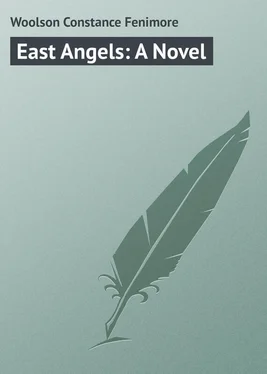Constance Woolson - East Angels - A Novel
Здесь есть возможность читать онлайн «Constance Woolson - East Angels - A Novel» — ознакомительный отрывок электронной книги совершенно бесплатно, а после прочтения отрывка купить полную версию. В некоторых случаях можно слушать аудио, скачать через торрент в формате fb2 и присутствует краткое содержание. Жанр: foreign_prose, на английском языке. Описание произведения, (предисловие) а так же отзывы посетителей доступны на портале библиотеки ЛибКат.
- Название:East Angels: A Novel
- Автор:
- Жанр:
- Год:неизвестен
- ISBN:нет данных
- Рейтинг книги:5 / 5. Голосов: 1
-
Избранное:Добавить в избранное
- Отзывы:
-
Ваша оценка:
- 100
- 1
- 2
- 3
- 4
- 5
East Angels: A Novel: краткое содержание, описание и аннотация
Предлагаем к чтению аннотацию, описание, краткое содержание или предисловие (зависит от того, что написал сам автор книги «East Angels: A Novel»). Если вы не нашли необходимую информацию о книге — напишите в комментариях, мы постараемся отыскать её.
East Angels: A Novel — читать онлайн ознакомительный отрывок
Ниже представлен текст книги, разбитый по страницам. Система сохранения места последней прочитанной страницы, позволяет с удобством читать онлайн бесплатно книгу «East Angels: A Novel», без необходимости каждый раз заново искать на чём Вы остановились. Поставьте закладку, и сможете в любой момент перейти на страницу, на которой закончили чтение.
Интервал:
Закладка:
"Young Miss 'lows dese yere's yappul -trees," Pablo said to Raquel, with a fine scorn, as he dug objectingly round their roots. "An' 'lowing it, ' lowing it, Raquel, she orders accordin'!"
But the southern trees had lived, and had even, some of them, thrived a little under the unwonted northern methods applied to them; Mrs. Thorne, therefore, was able to rise above old Pablo's disapprovals – a feat, indeed, which she had been obliged to perform almost daily, and with regard to many other things than oranges, ever since her first arrival at East Angels, seventeen years before.
This lady now seated herself on a bench under the rose-tree. She had tied on, over her neat little widow's cap, the broad-brimmed palmetto hat which she usually wore in the garden; this hat had fallen slightly back, and now its broad yellow brim, standing out in a circle round her small face, looked not unlike the dull nimbus with which the heads of the stiff, sweet little angels in the early Italian paintings are weighted down. The clergyman, Mr. Moore, stood beside her.
The Rev. Middleton Moore, rector of St. Philip and St. James's, Gracias-á-Dios, was a tall gentleman, with narrow, slightly stooping shoulders, long thin hands, a long smooth face, and thin dry brown hair which always looked long (though it was not), because it grew from the top of his head down to his ears in straight flat smoothness, the ends being there cut across horizontally. His features were delicately moulded. His long feet were slender and well-shaped. There was a charming expression of purity and goodness in his small, mild blue eyes. He was attired in clerical black, all save his hat, which was brown – a low-crowned, brown straw hat adorned with a brown ribbon. Mrs. Penelope Moore, his wife, profound as was her appreciation of the dignity of his position as rector of the parish, could yet never quite resist the temptation of getting for him, now and then, a straw hat, and a straw hat, too, which was not black; to her sense a straw hat was youth, and to her sense the rector was young. It was in a straw hat that she had first beheld and admired him as the handsomest, as well as the most perfect, of men; and so in a straw hat she still occasionally sent him forth, gazing at the back view of it and him, from the rickety windows of her Gothic rectory, with much satisfaction, as he went down the path towards the gate on his way to some of the gentle Gracias entertainments. For of course he wore it only on such light, unofficial occasions.
Dr. Kirby, meanwhile, was making the circuit of the orange grove. He stopped and peered up sidewise into each tree, his head now on one shoulder, now on the other; then he came back, his hands and pockets filled with oranges, which he offered to all; seating himself on the low curb of an old well, he began to peel one with the little silver knife which he kept for the purpose, doing it so deftly that not a drop of the juice escaped, and looking on calmly meanwhile as the other bird, Carlos Mateo, went through his dance for the entertainment of the assembled company. Carlos Mateo was a tall gray crane of aged and severe aspect; at Garda's call he had come forward with long, dignified steps and stalked twice round the little open space before the rose-tree, following her with grave exactitude as she walked before him. She then called him to a path bordered with low bushes, and here, after a moment, the company beheld him jumping slowly up and down, aiding himself with his wings, sometimes rising several feet above the ground, and sometimes only hopping on his long thin legs; he advanced in this manner down the path to its end, and then back again, Garda walking in front, and raising her hand as he rose and fell, as though beating time. Nothing could have been more comical than the solemnity of the old fellow as he went through these antics; it was as if a gray-bearded patriarch should suddenly attempt a hornpipe.
His performance ended, he followed his mistress back to the company, to receive their congratulations.
"What can we give him?" said Winthrop. "What does he like?"
"He will not take anything except from me," answered Garda; she gathered a rose, and stood holding it by the stem while Carlos Mateo pecked gravely at the petals. The sun was sinking, his horizontal rays shone across her bright hair; she had taken off her hat, which was hanging by its ribbon from her arm; Winthrop looked at her, at the rose-laden branches above her head, at the odd figure of the crane by her side, at the background of the wild old garden behind her. He was thinking that he would give a good deal for a picture of the scene.
But while he was thinking it, Manuel had spoken it. "Miss Garda, I would give a year out of my life for a picture of you as you are at this moment!" he said, ardently. Winthrop turned away.
He went to look at some camellias, whose glossy leaves formed a thicket at a little distance; on the other side of this thicket he discovered a crape-myrtle avenue, the delicate trees so choked and hustled by the ruder foliage which had grown up about them that they stood like captives in the midst of a rabble, broken-hearted and dumb; with some pushing he made his way within, and followed the lost path. It brought him to a mound of tangled shrubbery which rose like a small hill at this end of the garden, decked here and there, in what seemed inaccessible places, with brilliant flowers. But the places had not been inaccessible to Torres. Winthrop met him returning from the thorny conflict with a magnificent stalk of blossoms which he had captured there, and was now bringing back in triumph; it was a long wand of gorgeous spurred bells, each two inches in length, crimson without, cream-color within, the lip of the flaring lower petal lined with purple, and spotted with gold. Torres carried his prize to Garda, and offered it in silence. She thanked him prettily in Spanish, and he stood beside her, his dark face in a dull glow from pleasure.
"Perhaps it is poisonous," murmured Manuel, taking good care, however, to murmur in English.
"Oh, my dearest child! pray put it down," said Mrs. Thorne, anxiously.
"It is quite harmless," said the clergyman, "I know the family to which it belongs. It is not indigenous here; probably the original shrub was planted in the garden many years ago, and has run wild."
Garda took the stalk in her right hand, extended her left rigidly, and, stiffening her light figure in a wooden attitude, looked meekly upward.
"Bravo! bravo!" said the Doctor from his well-curb, laughing, and beginning on a second orange.
She stood thus for a few instants only. But it was very well done – an exact copy of a dark, grim old picture in the little Spanish cathedral of Gracias, a St. Catherine with a stalk of lilies in her hand.
Winthrop, who had returned, was standing on the other side of the open space. Apparently he had not noticed this little pantomime. Garda looked at him for a moment. Then she left her place, went across, and gravely decorated him with her stalk of blossoms, the large stem going through three of the button-holes of his coat before it could hold itself firmly; the brilliant flowers extended diagonally across his breast, past his chin, and above one ear.
"Your hat will break the top buds," said Garda, surveying her handiwork. "Please take it off."
He obeyed. "For what sacrifice am I thus adorned?" he asked.
"It's no sacrifice," answered Garda, "it's a rebellion – a rebellion against your constant objections to everything in the world!"
"But I haven't opened my lips."
"That is the very thing; you object silently – which is much worse. I'm not accustomed to people who object silently. Everybody here talks; why don't you talk?"
This little dialogue went on apart, the others could not hear it.
"I do – when you give me an opportunity," Winthrop answered.
Читать дальшеИнтервал:
Закладка:
Похожие книги на «East Angels: A Novel»
Представляем Вашему вниманию похожие книги на «East Angels: A Novel» списком для выбора. Мы отобрали схожую по названию и смыслу литературу в надежде предоставить читателям больше вариантов отыскать новые, интересные, ещё непрочитанные произведения.
Обсуждение, отзывы о книге «East Angels: A Novel» и просто собственные мнения читателей. Оставьте ваши комментарии, напишите, что Вы думаете о произведении, его смысле или главных героях. Укажите что конкретно понравилось, а что нет, и почему Вы так считаете.












